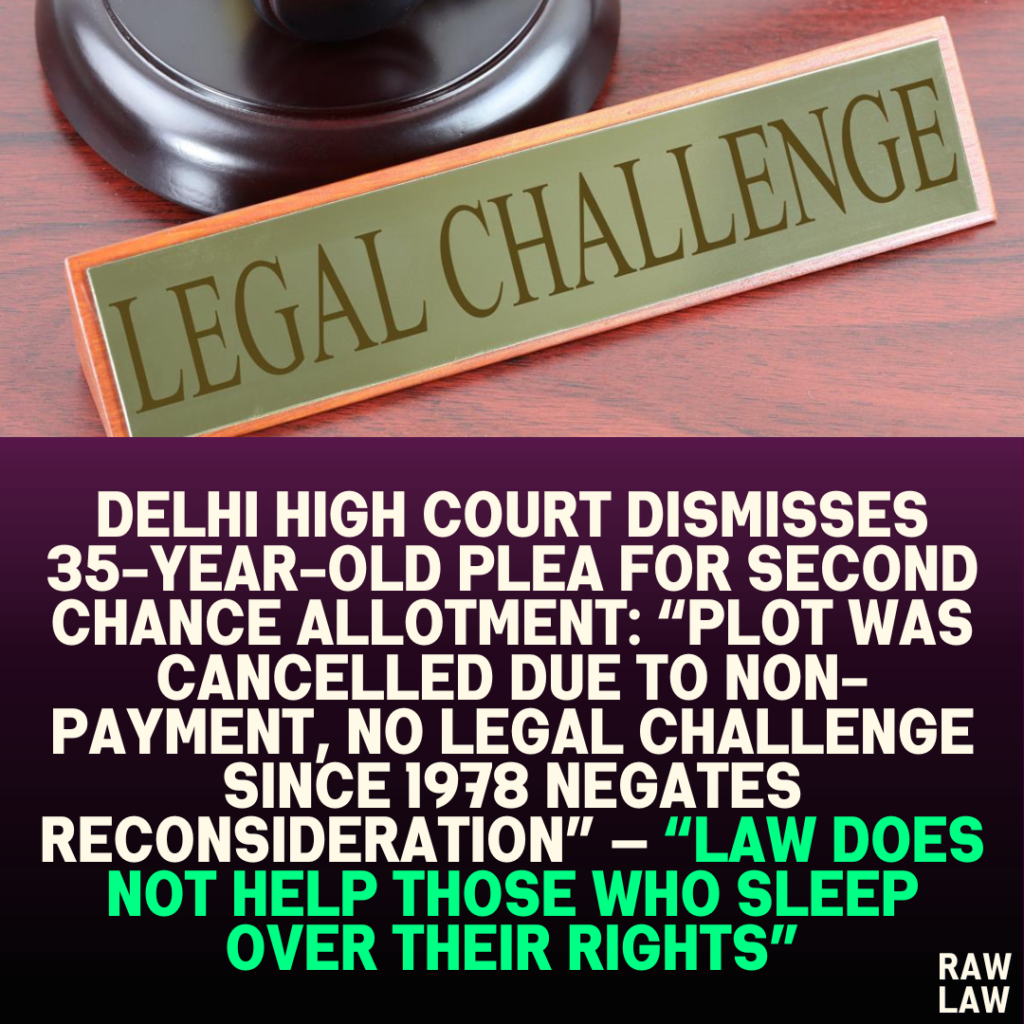Court’s Decision:
The Delhi High Court dismissed the petitions, holding that the petitioners had no legal right to a second chance for allotment of alternate plots. The Court emphasized that the failure to meet the stipulated requirements for the original offer and the delay of over 35 years rendered the claim unsustainable. The judgment concluded with, “Law does not help those who sleep over their rights” and dismissed the writ petitions along with all pending applications.
Facts:
The agricultural land of the petitioners was acquired by the government in 1968, for which compensation was paid. In 1975, both petitioners applied to the Land & Building Department, GNCTD, for allotment of an alternative plot under a government policy. Subsequently, in 1978, the Delhi Development Authority (DDA) offered them plots in Vikaspuri Residential Scheme. However, due to financial constraints, the petitioners were unable to make the required payment and requested cancellation of the offer with a plea to consider their names later. The DDA then cancelled the allotment and did not include them in the waiting list.
From 1982 onward, the petitioners made several representations to the DDA, claiming they now had the financial capacity to make the payment, but received no positive response. By 2004, a new policy was implemented reducing the number of allotment chances to two. In 2017, after a series of correspondences, the petitioners were informed that their files were lost and were advised to approach the respondent/DDA. The issue culminated in the filing of writ petitions before the High Court in 2018.
Issues:
- Whether the petitioners were entitled to a second chance for allotment of alternate plots.
- Whether the delay and laches barred the relief sought by the petitioners.
Petitioner’s Arguments:
- The petitioners contended that the DDA had allotted alternate plots to similarly placed persons who initially could not accept the first offer due to financial difficulties.
- They argued that despite repeated representations and available financial capacity, the DDA did not consider their request, causing grave injustice.
- It was further submitted that the cancellation of allotment in 1978 should not prevent reconsideration, especially since the cancellation was due to financial incapacity rather than willful rejection.
Respondent’s Arguments:
- The DDA argued that the petitioners were not entitled to any relief as they failed to make the requisite payment in 1978 and their application for a fresh allotment in 1982 was duly rejected.
- They emphasized that the present petition, filed after a lapse of 40 years, is barred by delay and laches.
- The DDA further contended that the petitioners had no legal right to an alternate plot, as the original offer was not surrendered but cancelled for non-payment.
Analysis of the Law:
The Court analyzed the scheme for allotment of alternate plots under the government policy and emphasized that the allotment was conditional on meeting the terms stipulated by the DDA. Since the petitioners did not fulfill the conditions, they forfeited their right to any subsequent allotment. The Court cited the legal principle that rights must be asserted within a reasonable time and delay defeats equity.
Precedent Analysis:
The Court referenced previous cases where claims for allotment were denied due to non-compliance with policy requirements and excessive delays. It highlighted the consistent view that delay and laches disentitle a party from equitable relief.
Court’s Reasoning:
The Court reasoned that the petitioners’ contention of “surrendering” the offer of allotment was not substantiated by the records, as the plot was cancelled due to non-payment rather than voluntary relinquishment. The lack of any legal challenge against the cancellation in 1978 or subsequent rejections in 1982, coupled with a silence of over three decades, negated their plea for reconsideration.
Conclusion:
The Court concluded that the petitioners had no vested right for a second chance in allotment and held that the policy changes in 2004 could not be applied retrospectively to benefit them. Therefore, the writ petitions were dismissed for being barred by delay and laches.
Implications:
The decision reinforces the principle that courts will not entertain stale claims, especially when petitioners fail to act on their rights for extended periods. The judgment sets a precedent that mere representations or requests do not constitute a legal right for reconsideration of allotments.
